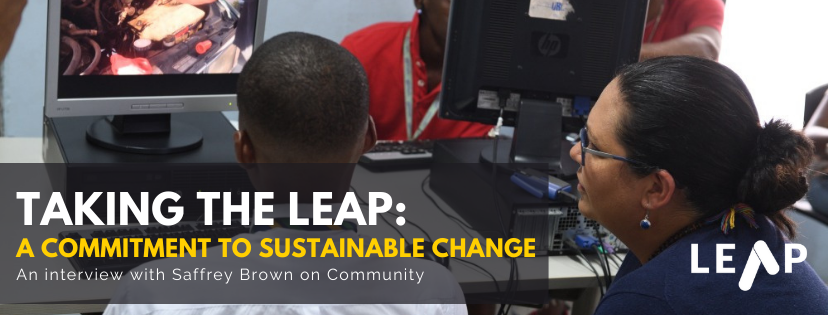Q: What have you learned from your 20+ years in community development?
“Real innovation exists at the community level”
Communities know what’s best for them, they often just need support to make it happen. Throughout my time working across sectors in Jamaica, I have found that there are a lot of people who aren't interested in truly providing communities with real change, as this requires an intervention model that is more sustainable. A lot of money is pumped into social interventions with no real sense of accountability of impact, as there is a greater emphasis on outputs. If people were serious about community development, funding would be directed to organisations that create real impact rather than big mammoth agencies that simply churn out outputs. Are we really aiding communities to become self-reliant and resilient?
Q: Well how do you move to a sustainable model of community development?
Sustainability comes in different forms - financial, technical, environmental. Historically, community interventions are designed from the outside in, and often focus on mitigating the impact of poverty, but not necessarily solving poverty. What you need to do is listen, engage and empower a community through collaboration and the provision of tools which enable them to have a steady income over a long term period primarily through partnerships that engage with their local economy.
Q: When did you begin to recognize the inequalities in the world and why is community development and sustainability important to you?
“Everyone should be respected equally and provided the same opportunities.”
I never felt I should make decisions for others, but rather, that my role was to remove the barriers which prohibit others from achieving their goals. In whatever way a person or community wanted to self actualize or improve their outcomes, I wanted to help make that happen. And so my work was not limited to a specific area of focus such as gender, community, youth, etc., but rather, towards providing mechanisms for empowerment and independence. Much of this work is delivered by civil society who must themselves, continue to work towards achieving financial and organisational sustainability. It is frustrating always having to meet the agendas of funders as organisations experience mission creep, and become funding-focused, which leads to them losing sight of what the organisation initially set out to achieve.
Q: What are some of the projects you have been a part of that you still think about today and you see as aspects of a success story?
Well I have to take it back to 2006 when I implemented the JNBS Source CRC social enterprise model in Jamaica - which at the time would’ve been known as community enterprise or community economic activity - with a very specific framework which detailed how community interventions can become sustainable. Social enterprises sought to generate revenue through trade in ways that benefited society at large. The budget for this initial project was 1/100 the size of another project I worked on earlier in London, but when you compare the impact in terms of community buy-in, transformation, engagement and ownership, I could not be more proud. It was an affordable intervention with BIG IMPACT!
Q: And any failures and if so, what advice would you give to avoid any future failings?
Of course I have had failures. If at the point when you’re starting a project, you do not think it will work, then it likely will not work, especially as people are usually more optimistic than pessimistic. If you are planning to do any project, especially one that is community-driven, ensure all the partners, ideas and objectives are aligned. If not, people will eventually lose interest and the project will have a greater likelihood of failure.
Q: Any parting words before you go?
“Change is often not a grand master plan”
The last 20 years in this field have been a compilation of experiences which continuously forced me to read, review and grow, even now as I develop my company, the LEAP Co. If you are committed to creating real change, then do the research, take the steps and commit to the process – learn, adapt and adjust.


